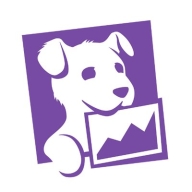

Entuity and Datadog compete in the infrastructure monitoring and management sector. Entuity has advantages in pricing and support, but Datadog's broader feature range could make it the preferred choice for comprehensive monitoring and analysis.
Features: Entuity offers network traffic analysis, simplified network management, and automated network discovery with topology mapping. Datadog includes extensive integrations, real-time monitoring, and rich analytics capabilities, focusing on both infrastructure and application monitoring, making it ideal for diverse enterprise environments.
Room for Improvement: Entuity could enhance its application monitoring capabilities and provide more integrations to match Datadog's breadth. Improving user interface customization and expanding analytics capabilities are other areas for Entuity. Datadog could streamline deployment processes for user-friendliness and reduce complexity in multi-cloud environments. Enhancing the pricing model to be more attractive for smaller organizations and providing more focused customer support options could also benefit Datadog.
Ease of Deployment and Customer Service: Entuity offers straightforward deployment with strong network device support, providing personalized assistance. Datadog's cloud-native model supports rapid deployment and scalable usage, supplying comprehensive online resources for self-service. Datadog's extensive support systems cater to users comfortable with independent problem-solving.
Pricing and ROI: Entuity's competitive setup cost focuses on network-focused ROI, ideal for businesses prioritizing network infrastructure. Datadog might have higher initial expenses, but its broad feature set provides long-term ROI potential for enterprises needing versatile monitoring solutions. The investment in Datadog is justified by its extensive capabilities, which suit organizations seeking comprehensive application and infrastructure monitoring.
| Product | Market Share (%) |
|---|---|
| Datadog | 2.5% |
| Entuity | 0.7% |
| Other | 96.8% |


| Company Size | Count |
|---|---|
| Small Business | 80 |
| Midsize Enterprise | 46 |
| Large Enterprise | 99 |
| Company Size | Count |
|---|---|
| Small Business | 4 |
| Midsize Enterprise | 2 |
| Large Enterprise | 3 |
Datadog integrates extensive monitoring solutions with features like customizable dashboards and real-time alerting, supporting efficient system management. Its seamless integration capabilities with tools like AWS and Slack make it a critical part of cloud infrastructure monitoring.
Datadog offers centralized logging and monitoring, making troubleshooting fast and efficient. It facilitates performance tracking in cloud environments such as AWS and Azure, utilizing tools like EC2 and APM for service management. Custom metrics and alerts improve the ability to respond to issues swiftly, while real-time tools enhance system responsiveness. However, users express the need for improved query performance, a more intuitive UI, and increased integration capabilities. Concerns about the pricing model's complexity have led to calls for greater transparency and control, and additional advanced customization options are sought. Datadog's implementation requires attention to these aspects, with enhanced documentation and onboarding recommended to reduce the learning curve.
What are Datadog's Key Features?In industries like finance and technology, Datadog is implemented for its monitoring capabilities across cloud architectures. Its ability to aggregate logs and provide a unified view enhances reliability in environments demanding high performance. By leveraging real-time insights and integration with platforms like AWS and Azure, organizations in these sectors efficiently manage their cloud infrastructures, ensuring optimal performance and proactive issue resolution.
We monitor all Network Monitoring Software reviews to prevent fraudulent reviews and keep review quality high. We do not post reviews by company employees or direct competitors. We validate each review for authenticity via cross-reference with LinkedIn, and personal follow-up with the reviewer when necessary.